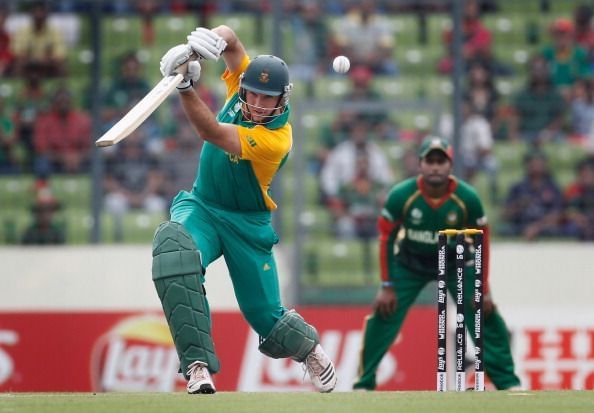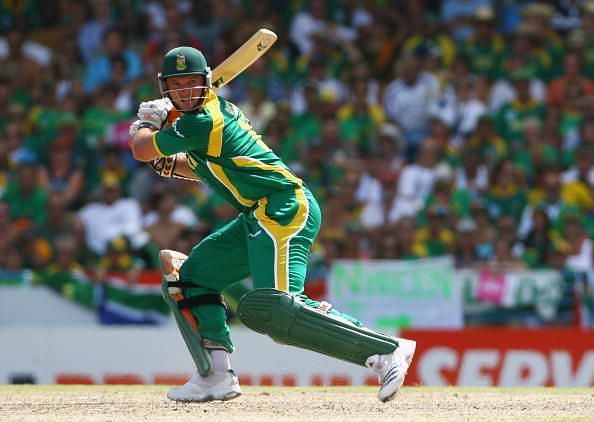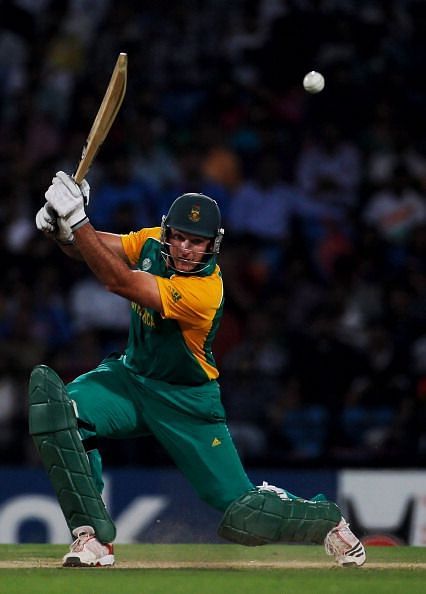
Cricket World Cup history: Graeme Smith, ups and downs while leading from the front

When the 2003 World Cup came around, Graeme Smith had been on the international circuit for just about a year. He was not a regular member of the South African playing eleven, though, with Gary Kirsten and Herschelle Gibbs opening the batting for South Africa. However, the way that he not only cemented his place in the side but also became captain, is evidence of his immense talent and dynamic personality.
Starting out in 2003
The southpaw’s opportunities were few when the cricket carnival came to his nation. Smith got his chance in the match where two brilliant hundreds were hit against New Zealand . He helped the first centurion, Gibbs, raise 60 in an opening stand inside 10 overs. Smith was dismissed for 23, and Gibbs went on to hammer a superb 143. The Kiwi skipper Stephen Fleming repaid the compliment amid rain, as he carved out a magnificent 134 of his own to upstage the hosts.
The next appearance was in the face-off with Canada, with Kirsten dropping down to No. 3. Amazingly, the minnows created a flutter, with their opening bowlers dismissing the seasoned Gibbs, Kirsten and Jacques Kallis cheaply. South Africa slid to 23 for three. Smith got together with Boeta Dippenaar to salvage the innings. They put on 109, which set the side on its way to a competitive total and an easy victory. Smith scored 63 off 79 deliveries with six boundaries.
Everything hinged on their last Pool B match. Sri Lanka set a stiff target, putting up 268 for nine on the board. Smith and Gibbs provided just the right platform, raising 65 in 11 overs. Then, the first delivery from a spinner, Aravinda de Silva, consumed Smith. He scored 35 off 34 deliveries with five boundaries.
Wickets began to fall at regular intervals just as the weather started looking ominous. In a horrible blunder, the Proteas assumed the par score by the Duckworth-Lewis method to be the winning one and ended up tying the game they needed to win. For the second successive World Cup, South Africa exited by way of a tie in heart-breaking circumstances. Smith had performed fairly well for a newcomer who was in and out of the side.
Things changed dramatically for Smith as he was handed the captaincy after this tournament at the age of 22, the youngest in his country’s history. Suddenly, he emerged as a larger-than-life character. His willow too kept pace with that growing stature.
Flashes of brilliance in 2007

It was an onerous task for skipper Graeme Smith in the Caribbean in 2007. The first match, though, was a picnic in Warner Park. Heavy overnight rain had left a drenched outfield that curtailed the match to a 40-overs-a-side game, which was just as well for the Dutch. A.B. de Villiers returned to the quiet of the dressing room off the second delivery, but Smith and Kallis enjoyed themselves in a 114-run stand in 18.4 overs. Smith slammed 67 off 59 balls with six fours and 2 sixes. Kallis hit an unbeaten 128 off 109 balls.
There was a shower of sixes, a total of 18, unprecedented in a one day game.. Every batsman had his fill. Herschelle Gibbs lashed seven, including six of them in a Daan van Bunge over. Mark Boucher raced to the fastest World Cup fifty in a mere 21 balls, a record that another wicketkeeper Brendon McCullum soon broke by one delivery, and then went even faster in 2015. All the seven bowlers were hit for sixes. Holland crumbled to a heavy defeat.
After restricting another minnows Scotland to 186 for eight, Smith and de Villiers plundered 134 runs in 15.5 overs. De Villiers was out for 62, but Smith went on to score 91 off just 65 balls with 13 fours and a six. This was to be his highest in the World Cup. His side won by seven wickets with only 23.2 overs bowled.
The awesome Aussies got down to some big hitting of their own when the two teams faced up. Matthew Hayden belted the fastest century of the World Cup in 66 balls, Ricky Ponting and Michael Clarke got nineties, and the reigning champions hit up 377 for six, their highest total in the World Cup.
Smith and de Villiers were not prepared to throw in the towel. They went after the bowling, raising 160 in 21 overs. De Villiers was run out for 92. Smith then started cramping, and with his score on 72 and South Africa on 184 for one after 25.1 overs, he had to retire hurt. The momentum of the innings was broken and wickets began to tumble soon. Smith returned to the crease but could add just two more runs. His 74 came off 69 balls with 9 fours and 2 sixes. South Africa were bowled out for 294 off 48 overs.
Smith-Kallis stand tall, Malinga knocks out four in four
In the super-eight stage, the Proteas were faced with a target of 210 in the humdinger against Sri Lanka. After de Villiers fell for a duck, Smith and Kallis put on 95 in 16.2 overs. The crafty Muttiah Muralitharan had Smith caught behind for 59 off 65 deliveries with 7 fours and a six. Kallis scored 86 but Lasith Malinga captured an unprecedented four wickets off successive deliveries, to leave South Africa precariously placed at 207 for nine. Somehow the last pair managed to carry South Africa over the line.
Ireland were able to muster 152 runs in a rain-curtailed 35-over match. After de Villiers had fallen for his second successive duck, Smith and Kallis put on 70 in 11.4 overs. Smith departed for 41 off 45 balls, having struck sic boundaries. South Africa triumphed by seven wickets.
Smith ran into a bad patch as his side went on a roller-coaster ride. In a tournament in which the minnows provided many stunners, Bangladesh put up 251 for eight. South Africa struggled from the moment Smith fell for 12. They collapsed to 184 off 48.4 overs.
Next, Smith was dismissed for 7, but the Proteas made amends against the West Indies. De Villiers led the charge with a big century.Troubles continued to mount for Smith. He fell for 1 in the reverse at the hands of New Zealand.
Corrective action was required once more, and this time his bowlers, as well as batsmen, rose to the occasion. England were dismissed for 154 in 48 overs. Smith raised an opening stand of 85 with de Villiers. He carried his side to a nine-wicket triumph off a mere 19.2 overs, carving out an unbeaten 89 off 58 deliveries with 13 hits to the fence.
There had been an air of uncertainty during that period about Smith’s batting as well as his team’s performance, dazzling one day, dismal the next. They were pitted against the invincible Australians in the semi-final. The worst fears came true as the Proteas were skittled out for 149 in 43.5 overs. Smith was bowled for 2, and none of the others got to fifty.
The defending champions cantered to a seven-wicket win in 31.3 overs. Whether it was a clinical performance by the Australians, or whether the South Africans were brought down by their fickle form, the fact is that Graeme Smith’s men were not good enough to reach the final.
Smith had shown flashes of brilliance but was inconsistent as a top-order batsman - and captain at that - in a major tournament like this. Often he lost his wicket when he should have carried his team through
Disappointing 2011 World Cup

Graeme Smith would not look back at the next World Cup in 2011 with much satisfaction. Under his charge, a good performance in the league stage led to the all-too-familiar choke in the quarter-final. With the bat, he played a series of cameos, which only served to put the middle-order under pressure.
The start, however, was comfortable. A fine all-round bowling effort caused the West Indies to pack up for 222 in 47.3 overs. Though two early wickets fell, Smith was associated in a 119-run partnership with AB de Villiers, who scored a brilliant unbeaten century. While de Villiers was the aggressor, Smith held his end up. He was bowled for 45, attempting to hit across the line, having negotiated 78 deliveries and hit 2 fours. South Africa cantered to a seven-wicket win.
Facing veritable pushovers The Netherlands, Smith scored 20 in a 51-run opening stand with centurion Hashim Amla. A hundred by de Villiers helped raise a mammoth total of 351 for five. Holland were bowled out for 120 in under 35 overs.
The thrills provided by the English team in this tournament spanned their face-off with South Africa too. They folded up to the Proteas spin at Chepauk for just 171. Smith and Amla were on track, raising the 50 in 12.2 overs. With the score on 63, Graeme Swann made one turn and jump, grazing Smith’s glove on its way to wicket-keeper Matt Prior. He was gone for 22, and wickets continued to tumble. South Africa were all out for 165, pipped by 6 runs.
The Indian top-order was brilliant but South Africa did well to restrict them to 296 when it seemed they would pile up a monumental total. Dale Steyn bowled with fire to capture five wickets. Smith seemed to be picking up the momentum with Amla but holed out to mid-off for 16. Most of the other batsmen, though, contributed to the cause and South Africa were home with two balls to spare in an extremely tense finish.
After two high-pressure encounters, it would have been a respite facing qualifiers Ireland, though they could not be taken lightly. Smith was run out for 7 but South Africa won easily.
Smith looked in good nick against Bangladesh, raising the fifty of the innings in alliance with Amla in the ninth over. With more landmarks in the offing, Smith stepped down the wicket to Mahmudullah but was beaten as the ball dipped and spun away, stumped by Mushfiqur Rahim. Smith’s 45 came in 68 balls with four boundaries, the total at that stage being 98. South Africa went on to amass 284 for eight. Bangladesh were skittled for 78 in 28 overs, the lowest that South Africa had bowled out any team for in the World Cup.
Yet another cameo, yet another choke
South Africa were favorites in the quarter-final. They restricted New Zealand to 221 for eight. Amla succumbed to spin and uncertain bounce in the first over. Smith and Kallis progressed well, bringing up the half-century partnership in 11 overs. Smith then played a careless slash to be caught behind square off Jacob Oram, who was now on the way to a star turn that stunned the Proteas. Smith had played yet another cameo of 28 off 34 balls with the help of 2 boundaries.
In hindsight, he might pin down his team’s fall to his own folly, which also caused him to miss out on a worthwhile score in the tournament. Soon, wickets began tumbling regularly and, like 1996, they crashed out when they looked good enough to clinch the title. It was not a tournament Smith would look back with pride at.
Overall he has a fairly reasonable record in the World Cup, though it dipped considerably in 2011. His strike-rate, which was nearly 100 earlier, slipped to 86.35. For an opening batsman not to have scored a century in 20 innings is probably reflected in his sub-40 average. To be fair, Smith has been outstanding in international cricket overall, particularly in Test matches, and what is most significant is that with him at the helm South Africa reached the top in all forms of the game.
Graeme Smith’s World Cup batting and fielding record:
Matches 20, Highest Score 91, Runs 747, Average 39.31, Strike-rate 86.35, Fifties 6, Catches 15